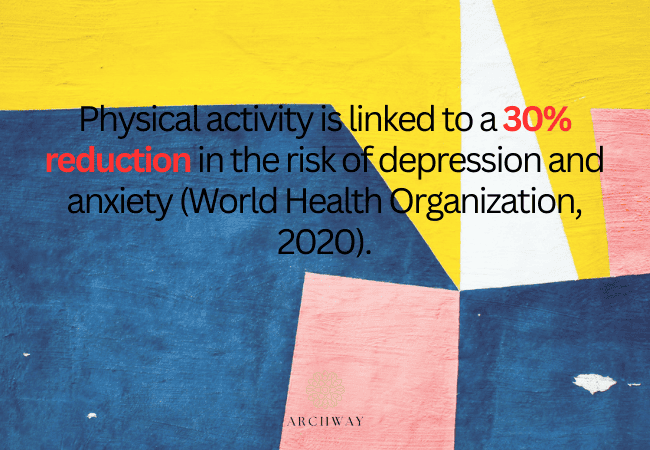Recovering from mental health challenges is a deeply personal and transformative journey, requiring a combination of professional care, emotional support, and healthy lifestyle changes. At Archway Behavioral Health, we recognize that no two recovery paths are the same. While therapy and medication are vital components, incorporating activities that foster emotional and physical well-being can significantly enhance the recovery process. These activities not only complement professional treatment, but they also empower individuals to take an active role in their healing.
In this blog, we will explore various activities that can support mental health recovery, as well as how therapies like CBT Therapy and DBT Therapy, and structured programs such as Partial Hospitalization Programs and Intensive Outpatient Programs, can further boost recovery outcomes.
1. Physical Activities to Enhance Mental Well-Being
Physical activity is one of the most effective ways to improve mental health. Regular exercise helps release endorphins, the body’s natural “feel-good” chemicals, which can significantly reduce feelings of anxiety, stress, and depression. Exercise also improves sleep quality, increases energy levels, and fosters a sense of accomplishment and self-worth.
Recommended Activities:
- Aerobic Exercise: Engaging in activities like walking, jogging, swimming, or cycling increases heart rate and promotes the release of endorphins, lifting mood and reducing stress.
- Yoga and Tai Chi: These practices combine gentle movement with breath control and meditation, which help calm the mind, improve emotional regulation, and reduce symptoms of anxiety and depression.
- Strength Training: Lifting weights or using resistance bands helps build physical strength and improves mental resilience by providing a sense of control and achievement.
In our Mental Health Treatment Programs at Archway Behavioral Health, we encourage clients to participate in physical activities as part of their holistic approach to treatment. Regular exercise, combined with therapy, offers long-term benefits for both the body and mind.
2. Mindfulness and Meditation for Emotional Regulation
Mindfulness and meditation are powerful practices for improving emotional regulation and promoting mental clarity. These practices involve paying attention to the present moment without judgment, which helps reduce anxiety, stress, and negative thought patterns. Mindfulness encourages individuals to accept their thoughts and emotions rather than trying to fight or suppress them.
Recommended Activities:
- Mindful Breathing Exercises: A simple technique where you focus on your breath, taking slow, deep breaths to calm the mind and body. This practice helps lower heart rate, reduces anxiety, and increases focus.
- Guided Meditation: Using apps or attending meditation groups, guided sessions can help individuals focus on relaxation, body awareness, and emotional healing.
- Body Scans: A mindfulness technique where you pay close attention to each part of your body, noticing any tension and allowing it to release. This promotes relaxation and helps reduce physical symptoms of stress.
Therapies like DBT Therapy Florida incorporate mindfulness techniques to help clients manage emotional dysregulation and distressing emotions. DBT Therapy Florida combines mindfulness with practical skills that allow individuals to cope with negative emotions in healthy ways.
3. Creative Outlets for Emotional Expression
Creative activities can be therapeutic for individuals in recovery. Art, music, writing, and other forms of self-expression provide a safe way for people to process complex emotions, reduce stress, and boost their self-esteem. Expressing oneself creatively allows individuals to release feelings that may be difficult to articulate in words, helping them understand and manage their emotions.
Recommended Activities:
- Art Therapy: Engaging in painting, drawing, or sculpting allows individuals to express emotions without words. Art therapy is especially helpful for those who find it difficult to talk about their feelings.
- Journaling: Writing regularly in a journal can help individuals clarify their thoughts and gain insight into their emotions. It’s also an effective tool for tracking progress in recovery.
- Music Therapy: Playing an instrument, singing, or simply listening to music can reduce anxiety, promote relaxation, and elevate mood.
At Archway Behavioral Health, we incorporate creative expression into treatment, recognizing its power to promote emotional healing and self-discovery as part of our Mental Health Treatment Programs.
4. Building Social Connections and Support Networks
Having a supportive social network is essential to mental health recovery. Social isolation can worsen symptoms of anxiety, depression, and other mental health issues. Building and nurturing relationships with family, friends, and peers in recovery can create a sense of belonging and accountability.
Recommended Activities:
- Support Groups: Joining group therapy sessions or peer-led support groups can be incredibly helpful. These groups provide a space to share experiences, receive encouragement, and learn from others who have faced similar challenges.
- Family Therapy: Involving family members in the recovery process strengthens bonds and provides a support system that helps individuals stay on track with their treatment plan.
- Volunteering: Helping others fosters a sense of purpose and builds connections within the community, which can boost self-esteem and reduce feelings of isolation.
Our Intensive Outpatient Programs (IOP) at Archway Behavioral Health provide a supportive, group-oriented environment, offering a sense of community while helping individuals learn valuable coping skills from their peers.
5. Establishing Healthy Daily Routines
Establishing a regular, structured routine is essential for mental health recovery. Having a consistent daily schedule helps individuals manage time, reduces stress, and provides a sense of control. This is especially important for individuals dealing with depression or anxiety, as a lack of routine can exacerbate feelings of chaos or overwhelm.
Recommended Activities:
- Daily Planning: Setting clear goals for each day can reduce feelings of uncertainty and provide a sense of accomplishment. This might include scheduling time for therapy, physical activity, and self-care.
- Sleep Hygiene: Establishing a regular bedtime routine and limiting distractions before bed helps improve the quality of sleep, which is critical for mental health recovery.
- Nutrition: Eating balanced, nutritious meals at regular intervals helps maintain energy levels and support overall well-being. Avoiding excessive caffeine and alcohol can also help manage mood fluctuations.
At Archway Behavioral Health, we emphasize the importance of maintaining a structured routine during Partial Hospitalization Programs (PHP) and Intensive Outpatient Programs (IOP). This structure helps our clients develop healthy habits that support long-term mental health.
6. Cognitive Behavioral Therapy (CBT) for Thought and Behavior Change
Cognitive Behavioral Therapy (CBT) is one of the most widely used and effective therapeutic approaches for treating anxiety, depression, PTSD, and other mental health conditions. CBT Therapy Florida helps individuals identify and challenge negative thought patterns and replace them with more balanced, realistic thoughts.
How CBT Helps in Recovery:
- Identifying Negative Thoughts: CBT helps clients recognize unhelpful or harmful thoughts that contribute to negative emotions and behaviors. By identifying these thoughts, individuals can begin to change how they react to certain situations.
- Cognitive Restructuring: CBT teaches individuals to reframe negative thinking patterns and replace them with healthier, more adaptive thoughts.
- Behavioral Activation: This aspect of CBT encourages individuals to engage in activities that improve mood, such as pursuing hobbies, socializing, or exercising.
CBT Therapy Florida is an integral part of our Mental Health Treatment Programs at Archway Behavioral Health, as it provides clients with practical tools to manage their thoughts, emotions, and behaviors.
7. Spiritual Practices for Personal Growth
For many people, spirituality is an important part of their mental health recovery. Whether through religion, meditation, or personal reflection, spiritual practices can provide individuals with a sense of purpose, inner peace, and connection to something greater than themselves.
Recommended Activities:
- Prayer: For those with religious beliefs, prayer offers comfort and spiritual support during difficult times.
- Meditative Practices: Practices like mindfulness meditation or guided spiritual exercises can help individuals gain clarity and connect with their inner selves.
- Spiritual Retreats: These retreats provide opportunities for reflection, growth, and connection with like-minded individuals, offering a space to recharge mentally and spiritually.
Spirituality can serve as a foundation for building resilience and providing hope during challenging times in recovery.
Conclusion
Incorporating activities that promote emotional well-being into your daily routine can significantly enhance your mental health recovery. Whether through exercise, mindfulness, creative expression, or building social connections, these activities empower individuals to take an active role in their healing process. At Archway Behavioral Health, we integrate these activities into our Mental Health Treatment Programs, offering a holistic approach to recovery that combines evidence-based therapies like CBT Therapy Florida and DBT Therapy Florida with the transformative power of self-care and lifestyle changes. Take the step toward reclaiming your life and health—contact us at (888) 488-4103



